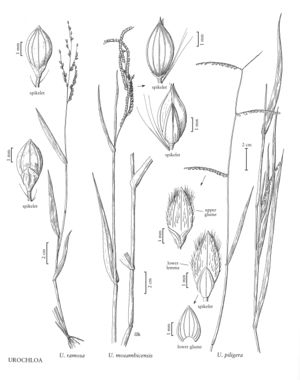Difference between revisions of "Urochloa ramosa"
FNA>Volume Importer |
FNA>Volume Importer |
||
| Line 23: | Line 23: | ||
-->{{Treatment/Body | -->{{Treatment/Body | ||
|distribution=Md.;Miss.;Tex.;La.;N.C.;Ala.;Tenn.;S.C.;Va.;Ark.;Ga.;Ky.;Fla. | |distribution=Md.;Miss.;Tex.;La.;N.C.;Ala.;Tenn.;S.C.;Va.;Ark.;Ga.;Ky.;Fla. | ||
| − | |discussion=<p>A weedy species of tropical Africa and Asia, | + | |discussion=<p>A weedy species of tropical Africa and Asia, Urochloa ramosa has spread throughout the tropics and subtropics, including the southeastern United States. It is considered a weed in the Flora area, but it is is cultivated in India as a grain and forage crop; the grain is sometimes used for birdseed.</p> |
|tables= | |tables= | ||
|references= | |references= | ||
| Line 39: | Line 39: | ||
|basionyms= | |basionyms= | ||
|family=Poaceae | |family=Poaceae | ||
| + | |illustrator=Linda A. Vorobik and Cindy Roché | ||
|distribution=Md.;Miss.;Tex.;La.;N.C.;Ala.;Tenn.;S.C.;Va.;Ark.;Ga.;Ky.;Fla. | |distribution=Md.;Miss.;Tex.;La.;N.C.;Ala.;Tenn.;S.C.;Va.;Ark.;Ga.;Ky.;Fla. | ||
|reference=None | |reference=None | ||
| Line 44: | Line 45: | ||
|publication year= | |publication year= | ||
|special status= | |special status= | ||
| − | |source xml=https:// | + | |source xml=https://bibilujan@bitbucket.org/aafc-mbb/fna-data-curation.git/src/314eb390f968962f596ae85f506b4b3db8683b1b/coarse_grained_fna_xml/V25/V25_1319.xml |
|subfamily=Poaceae subfam. Panicoideae | |subfamily=Poaceae subfam. Panicoideae | ||
|tribe=Poaceae tribe Paniceae | |tribe=Poaceae tribe Paniceae | ||
Revision as of 16:14, 30 October 2019
Plants annual; tufted. Culms 10-65 cm, decumbent, rooting or not at the lower nodes; nodes pubescent. Sheaths usually puberulous, sometimes glabrous or sparsely pilose, margins ciliate; ligules 0.8-1.7 mm; blades 2-25 cm long, 4-14 mm wide, glabrous, margins scabrous. Panicles 3-13 cm, simple, with 3-15 spikelike primary branches; primary branches 1-8 cm, divergent, axils glabrous, axes 0.4-0.6 mm wide, triquetrous, glabrous, scabrous, or pubescent, with or without some papillose-based hairs; secondary branches, if present, confined to the lower branches; pedicels shorter than the spikelets, scabrous or pubescent. Spikelets 2.5-3.4 mm long, 1.3-2 mm wide, ellipsoid, apices broadly acute to acute, paired, appressed to the branches. Glumes scarcely separated, rachilla internode between the glumes not pronounced; lower glumes 1-1.5 mm, 1/3 – 1/2 as long as the spikelets, glabrous, 3-5-veined; upper glumes 2.5-3.4 mm, usually puberulent, sometimes glabrous, margins sometimes somewhat pubescent, 7-9-veined, without evident cross venation; lower florets sterile, lower lemmas 2.4-3.3 mm, usually puberulent or occasionally glabrous, margins not ciliate, without cross venation, 5-veined; upper lemmas 2.3-3.3 mm, acute, mucronate; anthers 0.7-1.2 mm. Caryopses 1.2-2.3 mm; hila punctiform. 2n = 36 (usually); also 14, 28, 32, 42, 46, 72.
Distribution
Md., Miss., Tex., La., N.C., Ala., Tenn., S.C., Va., Ark., Ga., Ky., Fla.
Discussion
A weedy species of tropical Africa and Asia, Urochloa ramosa has spread throughout the tropics and subtropics, including the southeastern United States. It is considered a weed in the Flora area, but it is is cultivated in India as a grain and forage crop; the grain is sometimes used for birdseed.
Selected References
None.
